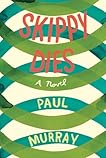 Skippy Dies by Paul Murray
Skippy Dies by Paul MurrayMy rating: 5 of 5 stars
I'm the product of an Irish Catholic boarding school for boys. So I approached Skippy Dies with reservations, and a certain amount of trepidation. The defining characteristic of life in a boys' boarding school is tedium - would Paul Murray be able to capture the tedium accurately and still write an interesting book? Would reading it stir up a bunch of memories best left undisturbed? And could the book possibly live up to the considerable hype that it has generated?
It turned out to be pretty amazing. Paul Murray does indeed get boarding school life down right - he completely nails it. His more significant accomplishment is to have written a book whose appeal transcends the specificity of its setting. Skippy Dies is a sprawling, ambitious doorstopper of a book, with an extensive cast of characters (jocks, nerds, priests, lay teachers, parents, drug dealers, psychopaths), not unlike a Dickens story. Fortunately, Murray has the skill to bring these assorted character to life and to tell a story that grabs and keeps the reader's interest.
The main focus of the book is to present the events that led up to the death of 14 year old Skippy and to explore its effect on the school community. Along the way, Murray considers a huge variety of disparate themes, ranging from string theory to ancient Irish burial mounds to trench warfare in World War I. Not to mention the pervasive adolescent obsession with sex. At times it seems as if these are mere digressions in a book that's already quite hefty, but the author knows what he's about, and pulls the various threads of his tapestry together to a powerful and satisfying conclusion. With so many balls in the air, you keep expecting him to crash and burn, but he doesn't -- the writing is superb throughout, the story never flags, you don't want it to stop and are a little bit sad when it does.
What do we ask of a good novel? A question with as many answers as readers. I take a slightly old-fashioned view. If an author can create a vividly imagined world, make me care about his characters, and tell a good story that moves me, then I'm a happy camper. Paul Murray does all of these things in this terrific book, and does them so brilliantly that the story transcends the specificity of its particular milieu. Other reviewers have suggested that the book is likely to appeal only to male readers - I couldn't disagree more.
This is a terrific book. The Man Booker judges should hang their heads in shame for their failure to include it on this year's shortlist.
And now, in the unpardonable dreck department:
 The Pig Did It by Joseph Caldwell
The Pig Did It by Joseph CaldwellMy rating: 1 of 5 stars
This piece of pig manure is a good illustration of the dangers of following recommendations found on amazon.com. Described as a "comic novel" set in my homeland, it has about as much wit as a lobotomized goldfish and lards on the blarney factor to nauseating excess. Other defects include lack of a discernible plot, grievously bloviated prose, and characters that don't even achieve the status of caricature. The following paragraph exemplifies its glaring inanity:
Remember the day he saved the four sons of Maggie Kerwin and the two sons of Sally Fitzgibbon, with their boat going down in the storm sent from the north. ... Lost in the waves and found and lost again, with the mountains falling right on top of him. Remember the seething water hissing at his valor, raging that he should defy them all -- the waves, the rocks, and all the nibbling fishes below. This was the day he dived down and brought up the four sons of Maggie Kerwin and the two sons of Sally Fitzgibbon, and only him still able to holler. And remember the rescue of Hanrahan's goat with the barn burning, and Kate's cat plucked from the high branches of the oak, and his clothes ripped open for all to see. Forget that his words were made of the night air and that he had the gift of transport like none other before him or since, that his closed eyes and open mouth were the surrender of all this world.... Remember what's there to remember and forget what's there to be forgot.
Kitty's face had turned from flesh to stone.
And so on, regrettably, until the reader throws up in his own mouth at the unmitigated dreadfulness of it all.
This style of writing might reasonably be termed "Blarney quaint". In my experience, most native Irish people find it ridiculous, borderline offensive, and incredibly annoying, while a surprisingly high proportion of non-Irish readers react positively (the word "charming" is often invoked).
This book was a "Washington Post Book World Best Book of 2008", and is the first volume in a so-called "pig trilogy". The mind actively boggles.
View all my reviews

No comments:
Post a Comment